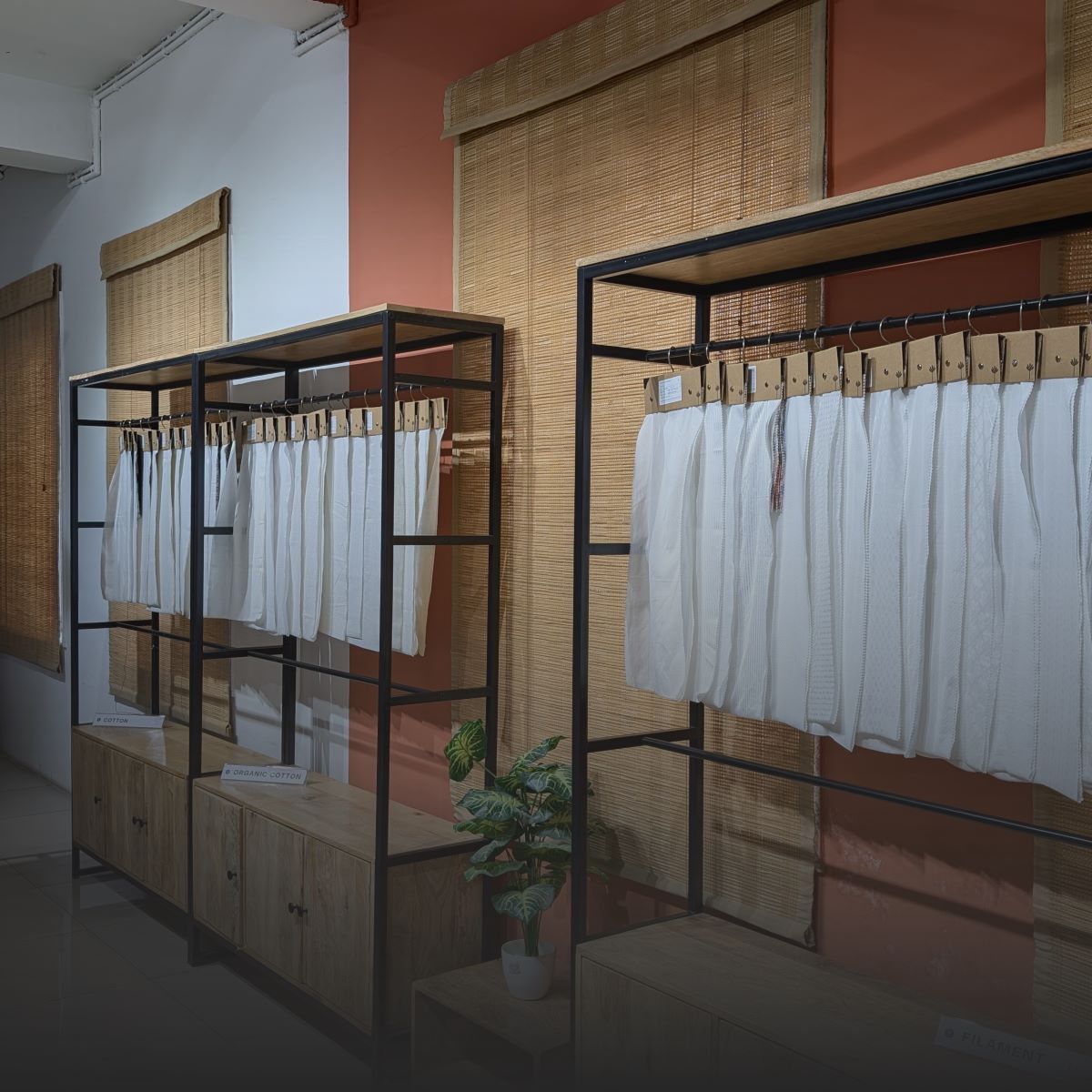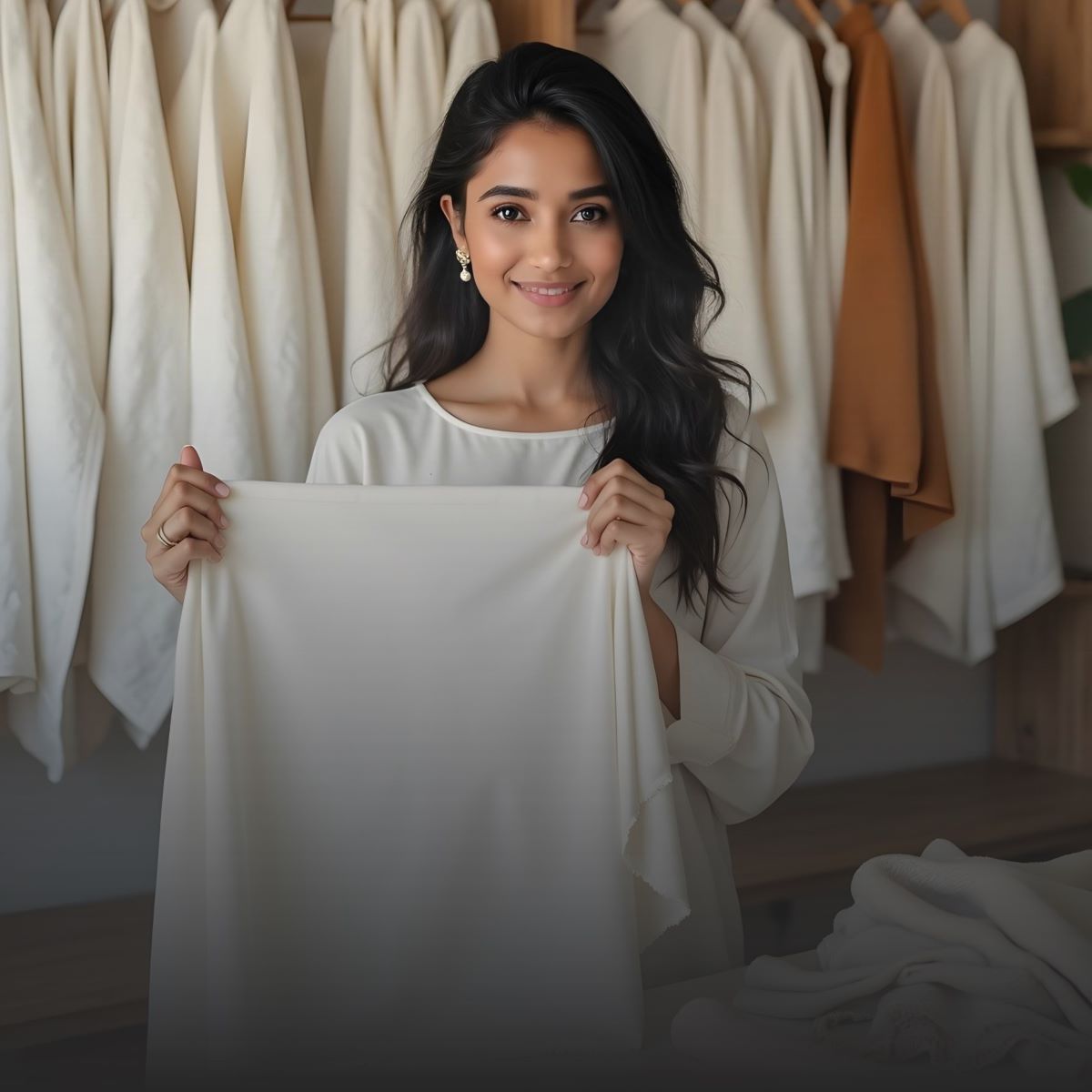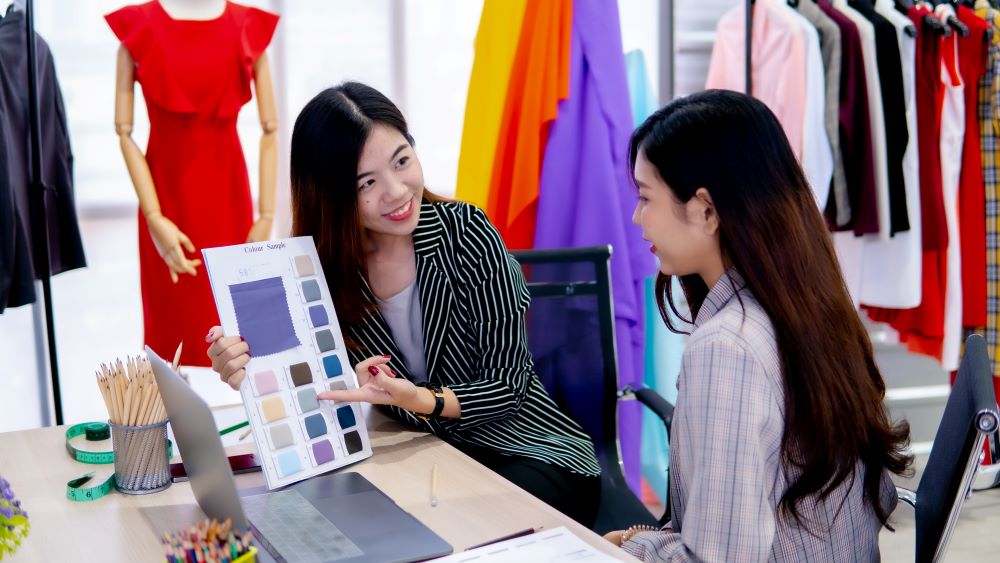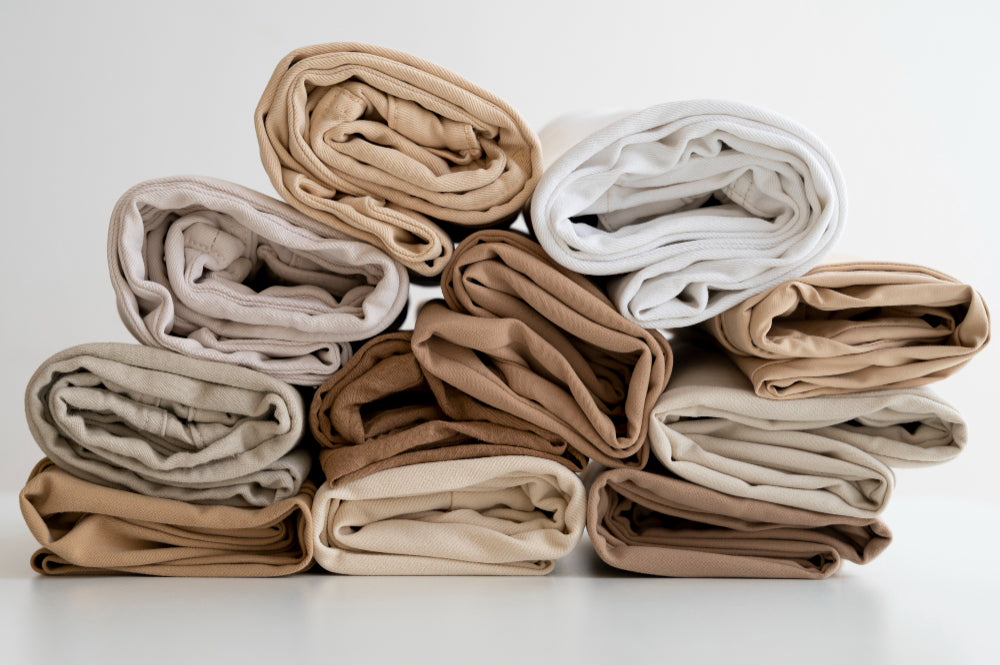Fabric plays a central role in how a fashion product comes together. For businesses focused on quality and originality, it is not enough to use ready-made options. The base fabric must match the design in color, pattern and performance. Without that control, the outcome often feels incomplete or inconsistent.
Many fashion businesses, especially those in early or growth stages, struggle to source fabric that fits their specific vision. Standard suppliers offer limited choices, fixed designs and high minimums. These factors make it hard to experiment, scale gradually or meet brand standards.
Customized fabric design and dyeing services help close that gap. They allow businesses to select the fabric type, adjust colors and apply tailored prints. The process offers flexibility while supporting both small runs and bulk orders. From concept to production, it helps brands maintain consistency and control.
In the next section, we will define what these services include and how they support different fashion needs.
What Are Customized Fabric Design and Dyeing Services?

Customized fabric design and dyeing services give brands control over how their fabric looks and performs. These services go beyond selecting pre-made materials. They allow full adjustment of design elements, from pattern placement to color finish.
A typical process begins with selecting a fabric base. From there, businesses can apply their own artwork or select from an existing design library. Once the design is approved, printing or dyeing methods are chosen based on quantity, texture and color needs.
Common printing techniques include digital, screen and hand block methods. Dyeing may involve machine-based processes or more manual approaches, depending on the requirement. Each step is managed to maintain consistency in quality.
This approach helps reduce production waste and supports faster decision-making. It works especially well for teams that value originality, speed and precision.
The next section will look at the types of businesses that benefit most from these custom services.
Who Needs Customized Fabric Design and Dyeing Services?

Customized fabric services support a range of fashion businesses that require more than standard options. These businesses focus on originality, flexible production and consistent quality. When the fabric must match the brand’s identity, customization becomes essential.
Types of businesses that benefit include:
- Independent designers developing signature styles and limited runs
- Boutique brands producing seasonal or exclusive collections
- Private labels requiring consistent quality across product lines
- Garment manufacturers fulfilling specific client requirements
- Print studios testing original artwork before large-scale production
Each of these groups uses customization to control base fabric, color tone and design placement. This level of precision supports faster decision-making and helps avoid errors during production.
In the next section, we will look at the features that define a reliable partner for fabric design and dyeing services.
Key Features to Look for in a Custom Fabric Design and Dyeing Company

Selecting the right partner for custom fabric services involves more than comparing prices. The quality of the outcome depends on how well the supplier supports your specific needs. A reliable partner offers clear processes, flexible options and consistent results.
Important features to consider:
- Low minimum order quantities to support small and mid-sized runs
- Access to a wide fabric range, including certified cotton fabric, cellulose and blends
- Multiple printing and dyeing methods such as digital, screen and hand block techniques
- In-house quality checks for color fastness, shrinkage and defect analysis
- Transparent service and support, from sampling to final delivery
These features help maintain control during development and production. When each element aligns with your process, the outcome becomes more predictable and brand-specific.
Next, we will introduce a company that meets these standards and supports fashion businesses of every size.
Fabriclore: A Reliable Source for Customized Fabric Design and Dyeing

Fabriclore offers a complete solution for brands seeking control over fabric aesthetics and performance. The platform supports every stage of fabric development, from sourcing to delivery, with built-in flexibility and a focus on quality.
Businesses can select from pre-sourced, fully traceable fabrics in cotton, silk, cellulose blends, polyester and certified sustainable bases. Custom designs can be created from scratch or adapted from Fabriclore’s print library. Sampling is simplified using digital previews on life-like models.
Printing and dyeing options include:
- Digital printing (starting at 100 meters per design)
- Screen printing (pigment, procian, discharge – minimum 300 meters)
- Hand block printing (Ajrak, Dabu, Kalamkari, Bagh – minimum 100 meters)
- Jigger and mill dyeing for uniform color application
- 3D rubber screen printing for textured outcomes
All services follow proprietary SOPs to ensure consistency in shade, placement and fabric performance.
In the next section, we will explore how this model supports both small and large fashion businesses.
Why Fabriclore Works for Small to Large Fashion Businesses
Fabriclore is structured to meet the demands of businesses at different stages. For newer brands, it reduces barriers to entry. For established ones, it offers stability, scale and process confidence without compromising speed or clarity.
Support is hands-on, with access to textile experts who assist during design development, sampling and production. Lead times range between 21 and 45 days based on method and season.
Key advantages include:
- No minimums for swatch ordering from the fabric catalogue
- Fast swatch delivery via DHL or FedEx from the Jaipur warehouse
- Real-time order updates through WhatsApp with weekly tracking
- Quality checks across 20+ defect types at a 10,000 sq. ft. facility
- AZO-free processing and optional certifications (GOTS, FSC, BCI)
- Availability of FPT (Fabric Package Test) reports and lab testing support
- Direct access to the Fabriclore Experience Studio for in-person review
This system is built not only to supply fabric but also to support better production outcomes from concept to shipment.
Next, we will look at other companies offering custom fabric and dyeing solutions.
Other Companies Offering Custom Fabric Design and Dyeing Services

Beyond Fabriclore, a number of companies offer fabric customization services tailored to designers, fashion brands and independent labels. These platforms vary in approach, features and service depth. Some focus on digital printing for short runs, while others serve broader creative markets. Understanding their capabilities helps businesses select the right partner based on location, scale and specific project needs.
Contrado (United Kingdom)
Contrado supports creators looking for fast digital fabric printing within the UK and Europe. It allows users to upload original artwork, scale designs and preview results in real time. The platform offers a curated range of fabrics suitable for fashion, interiors and accessories. Turnaround is fast and minimums are low, making it a practical option for sampling and short-run production. However, it may not suit businesses needing full-spectrum sourcing or custom dyeing support.
Spoonflower (United States)
Spoonflower is known for its open marketplace, where designers can sell or license their prints. The platform specializes in digital printing on cotton, linen and polyester bases, with no minimums. It suits businesses testing print ideas or building small-batch collections. While accessible, its focus is more retail-oriented. Services like lab testing, advanced quality control or support for complex dyeing processes are limited.
Printful Fabric Lab (Global)
Printful offers fabric printing as part of its wider print-on-demand model. The platform is designed for businesses testing new products with minimal investment. It automates most steps, from design upload to drop shipping. Fabric choices are limited and there is less room for technical control over print quality or color consistency.
Each of these companies provides a path toward fabric customization, though their tools and depth of service vary. For businesses seeking full control over sourcing, dyeing and quality assurance, a more production-oriented partner may be necessary.
Next, we will review the key factors to consider when selecting a fabric customization provider.
How to Choose the Right Fabric Customization Partner

Choosing a fabric partner affects every stage of your production process. From sampling to final delivery, the right provider should support your workflow, meet your quality standards and adapt to your business goals. Before making a decision, assess both the technical and service aspects of the offering.
Start by understanding what your business needs the most. A small brand creating limited collections may need lower order quantities. A growing label may focus more on fast delivery and consistent quality. Knowing what matters to you will make it easier to choose the right supplier.
Look closely at the partner’s capabilities across fabric types, design flexibility and production consistency. Ask for documentation, policies and samples where possible.
Key factors to evaluate include:
- Minimum order quantities that align with your production scale
- Range of available fabrics, including sustainable and certified options
- Printing and dyeing methods suitable for your design requirements
- Sampling and swatch availability to test quality before bulk ordering
- In-house testing and quality control to prevent production issues
- Clarity of lead times with realistic delivery estimates
- Communication channels, including expert support during development
- Certifications such as GOTS, FSC, BCI or AZO-free processing if sustainability matters to your brand
- Logistics and global shipping support if working across borders
- Transparency in pricing, packaging and fulfillment policies
Each of these factors plays a role in how smooth your production process will be. A partner that provides clarity, structure and timely updates helps prevent delays, rework or material waste.
As you evaluate options, focus on those that not only match your present goals but can also grow with your business. This will reduce the need to shift suppliers as your operations expand.
Next, we will close with final thoughts on how customized fabric services support better outcomes in fashion production.
Conclusion: Making the Right Choice for Custom Fabric Needs

Customized fabric design and dyeing services are no longer limited to large manufacturers. They now support a broad range of fashion businesses that need control, speed and flexibility in production. Whether you are developing a first collection or scaling established operations, the right partner can help bring your designs to life without compromising quality or timelines.
Platforms like Fabriclore offer end-to-end support with certified materials, modern printing methods, expert guidance and structured quality control. Other providers may suit smaller test runs or specific regional needs, depending on the goals of your collection.
What matters most is alignment. When your partner understands your product, timelines and process expectations, the results become consistent and dependable.
Before choosing, take time to review what matters most for your brand. Clear goals and the right support system will help ensure each fabric run matches your creative and commercial vision.
FAQs
What are the four types of textile dyeing?
The four main types of textile dyeing are:
- Piece dyeing – Fabric is dyed after weaving.
- Yarn dyeing – Yarn is dyed before weaving into fabric.
- Fiber dyeing – Fibers are dyed before spinning into yarn.
- Garment dyeing – Fully stitched garments are dyed as a final step.
Which fabric is in trend in India?
In India, trending fabrics include organic cotton, linen, modal, Chanderi silk and sustainable cellulose blends. Digital and hand block printed fabrics are especially popular in casual and ethnic wear segments.
Which state in India is famous for the textile industry?
Gujarat is one of the most famous states for the textile industry in India. It is known for cotton production, textile mills and large-scale fabric manufacturing. Tamil Nadu and Maharashtra are also major textile hubs.
How many types of fabric designs are there?
There are five common types of fabric design:
- Printed design
- Woven design
- Embroidered design
- Dyed design
- Knit pattern design
What is the vat dyeing process?
Vat dyeing is a method where fabric is immersed in a water-insoluble dye solution that becomes soluble through a chemical reduction. After dyeing, the fabric is exposed to air, which oxidizes the dye and makes it permanent.
What is the difference between garment dye and fabric dye?
Garment dye is done after the clothing is fully stitched, offering uniform color across seams and trims.
Fabric dye is applied before garment construction, allowing bulk dyeing of fabric rolls for consistent production across multiple garments.
We also happen to be a magnet for suggestions, and would love to catch yours….throw us yours on hello@fabriclore.com




